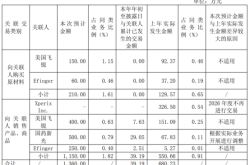Only China can make Volkswagen stand tall
![]() 11/06 2024
11/06 2024
![]() 507
507
The concealed problems will erupt sooner or later.
At the end of October this year, Volkswagen Group released its worst quarterly financial report in four years, accompanied by a layoff plan from Wolfsburg.
The financial report showed that Volkswagen Group sold 2.176 million vehicles globally in the third quarter of 2024, with revenue of 78.478 billion euros and net profit of only 1.576 billion euros. These three core indicators declined by 7.1%, 0.5%, and 63.7% year-on-year, respectively.
In addition to these three core parameters, other indicators, including operating profit, operating profit margin, and pure electric vehicle sales, are all on the decline.
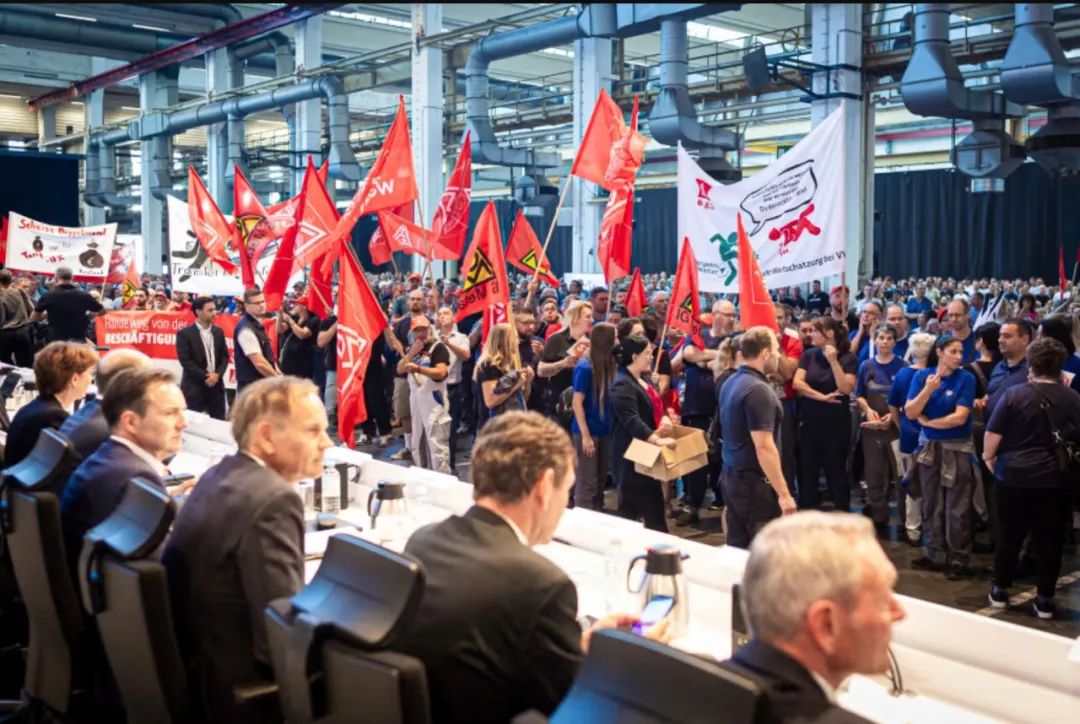
For Volkswagen, the bleak financial report not only brings shame to the board of directors but also exacerbates the already escalating conflict between the management and ordinary employees, making it almost irreconcilable.
Perhaps, Wolfsburg is really about to change.
Worst Quarterly Financial Report
For the full year, Volkswagen Group's cumulative revenue for the first nine months of 2024 was 237.279 billion euros, a year-on-year increase of 0.9%; operating profit was 12.907 billion euros, a year-on-year decrease of 20.5%; and net profit was 8.92 billion euros, a year-on-year decrease of 30.7%.
While revenue growth remained modest, the crux of the problem lies in the decline in operating profit and net profit. In fact, Volkswagen Group's net profit has been declining since the first quarter compared to the same period last year.
The first quarter was 2.918 billion euros, a year-on-year decline of 21.3%; the second quarter was 3.002 billion euros, a year-on-year decrease of 25.1%; and the third quarter was 1.576 billion euros, a year-on-year decline of 63.7%, representing a direct reduction of two-thirds.
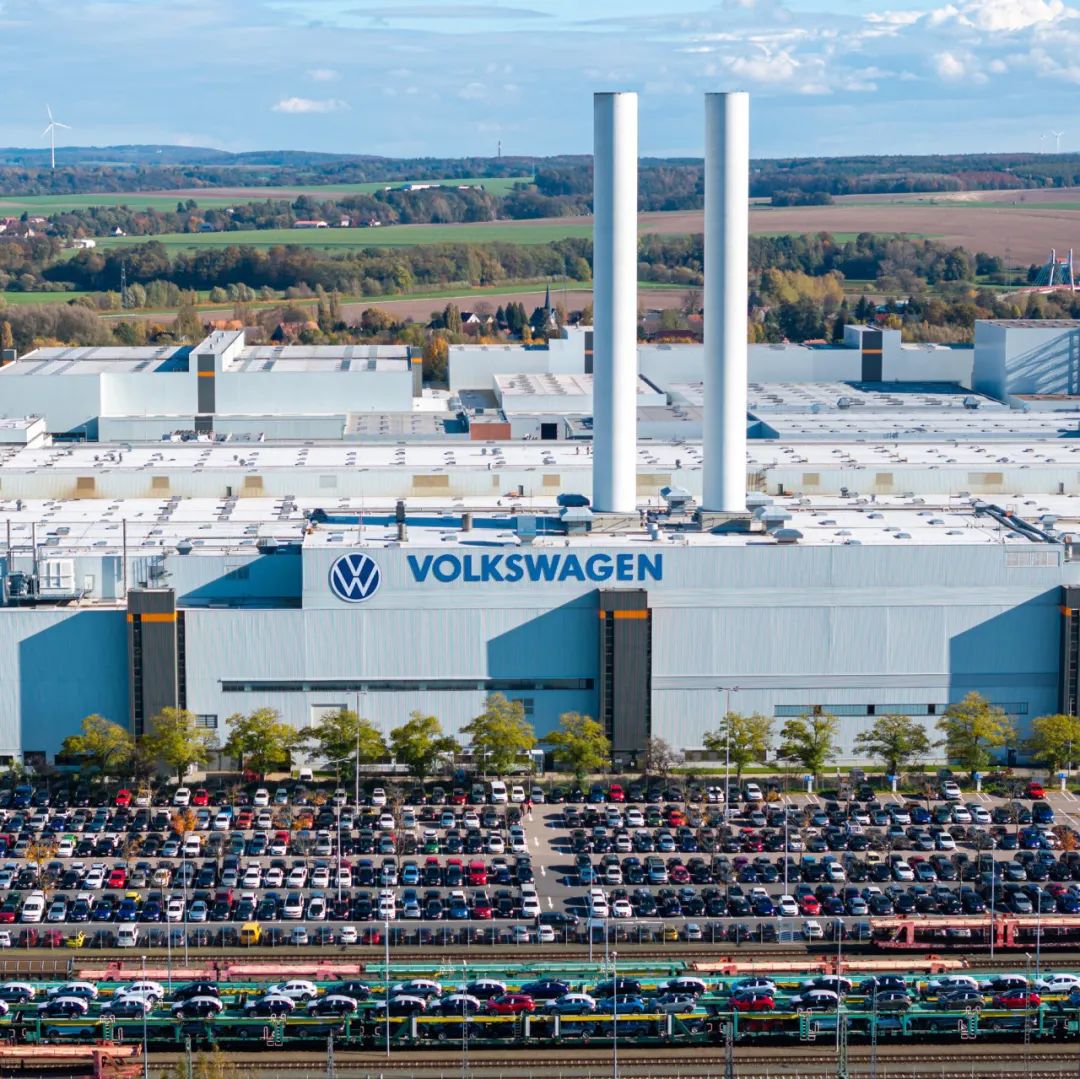
Notably, Volkswagen Group's global sales have not seen a significant decline. Even in the third quarter, global sales were still 2.176 million vehicles, a drop of only 7.1%. The only significant decline was in pure electric vehicle sales, which failed to maintain the growth momentum of the previous two quarters, falling nearly 10% against the trend.
Globally, Volkswagen Group's sales performance varies by region. In the North American market, sales in the third quarter declined by around 8% year-on-year, with only 102,000 vehicles sold in the U.S. market, making it difficult to rank at the forefront. However, it is worth noting that in pure electric vehicles, Volkswagen's sales maintained a high growth rate of 30%.
In the European home market, Volkswagen also maintained relatively stable sales. In the German market, sales in the third quarter were 205,000 vehicles, a year-on-year increase of 2.1%. As for other European markets, Volkswagen also showed growth, with sales exceeding 650,000 vehicles and remaining popular in countries like France, Spain, and Italy.
Volkswagen's performance was also noteworthy in other emerging markets. In Brazil, the largest single market in South America, sales in the third quarter were 98,000 vehicles, a year-on-year increase of 12.5%. In South Africa, sales of Volkswagen also maintained a positive growth with 18,000 vehicles sold.
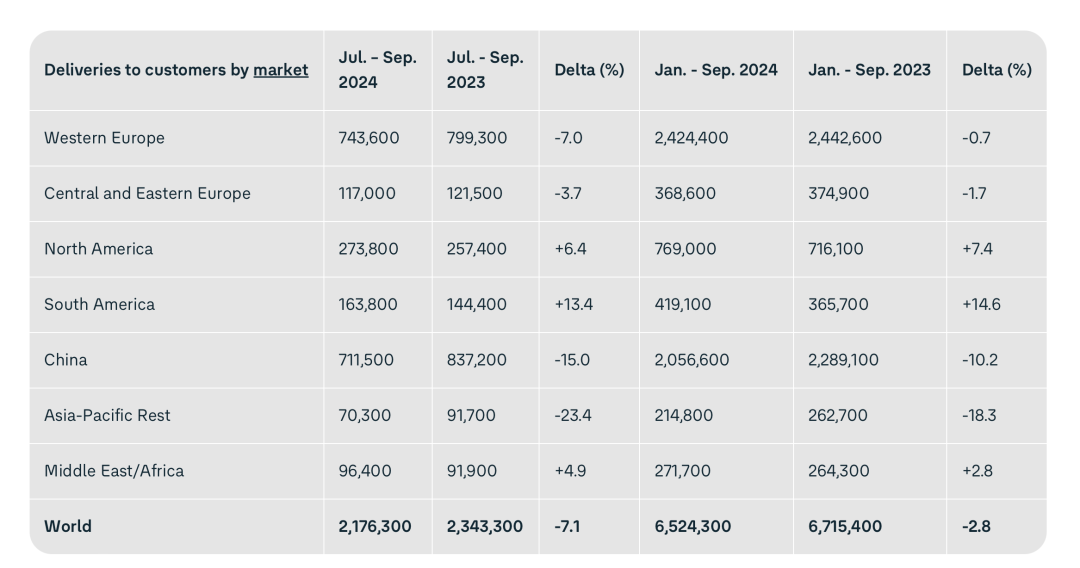
The only headache for Volkswagen is the Asian market. Apart from the difficult-to-penetrate Japanese market, Volkswagen performed well in India and South Korea in the third quarter. After introducing several new models in India, sales increased by 15.6% year-on-year, and the growth rate in the South Korean market was also above 10%.
The sharp decline in the Chinese market dealt a fatal blow to Volkswagen. Sales in China fell by 15% in the third quarter to 711,500 vehicles, still making it Volkswagen's largest single market.
Apart from the decline in sales in the Chinese market, although Volkswagen's sales in emerging markets have increased, the popular models are low-cost ones like the Polo, Golf, and Tiguan, which are difficult to drive profit growth.
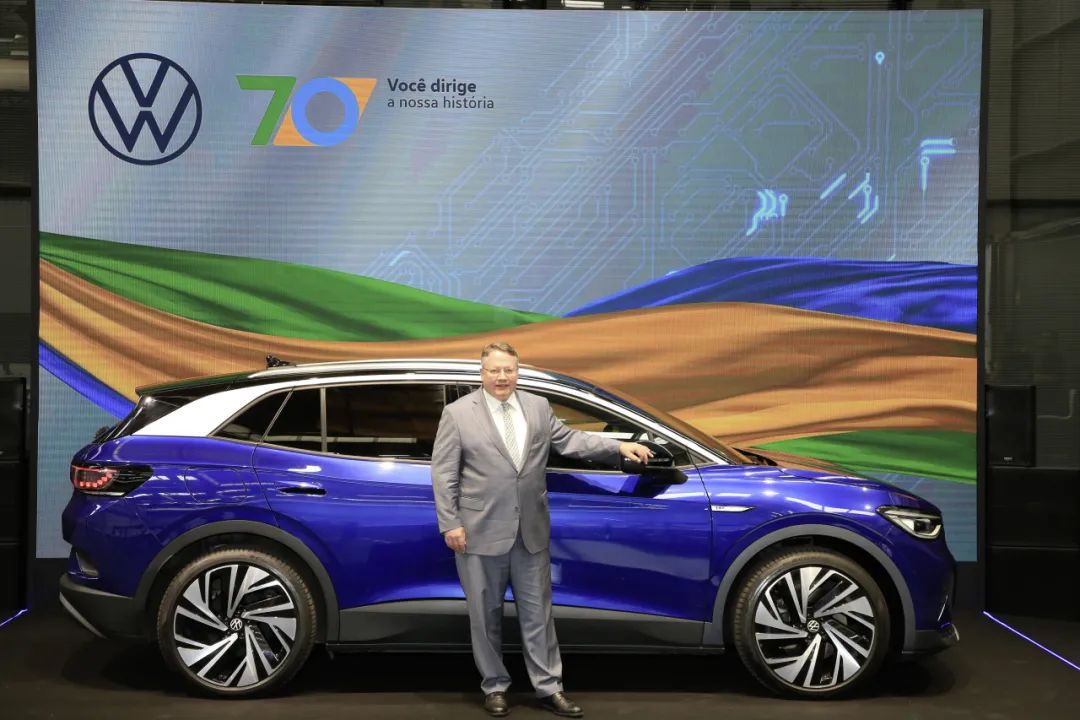
Meanwhile, despite maintaining sales growth in Europe, Volkswagen is struggling to tap into more market potential due to the sluggish economic recovery and demand for affordable new energy vehicles. Relying solely on the current ID series, it is difficult for Volkswagen to compete with new energy vehicle companies like Tesla in the European market.
Under the influence of multiple factors, Volkswagen was forced to release its worst quarterly performance and chose to optimize internally, initiating the largest cost-reduction plan.
Making Cuts at Home
In summarizing the decline in the third-quarter financial report, Volkswagen executive Marco Schubert attributed the problem to declining sales in China, noting the significant difference between current sales in China and those during his tenure there. However, this appears more like a scapegoating behavior.
As can be seen from the financial report, the main problem facing Volkswagen is not declining sales but the shrinking operating profit and net profit despite relatively stable revenue. These changes indicate serious issues with Volkswagen Group's cost control and profitability.
These problems have persisted for nine months, yet Volkswagen Group has failed to resolve them.
Prior to the release of this financial report, Daniela Cavallo, chair of Volkswagen's works council, announced at an employee event in Wolfsburg the company management's latest plans, including closing at least three German factories, laying off tens of thousands of employees, and downsizing other factories.
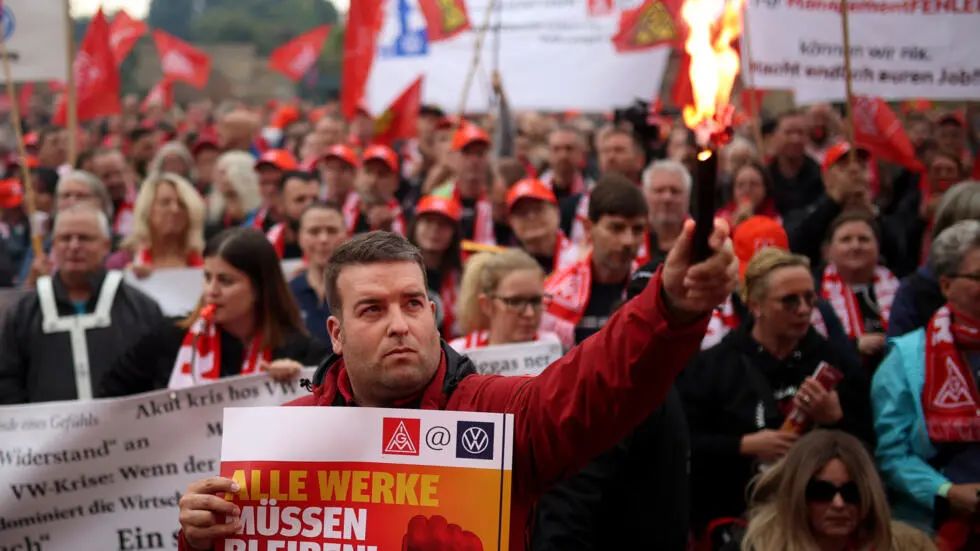
Volkswagen Group has begun seeking internal reforms. According to the plan, Volkswagen will reduce the monthly salaries of all employees by 10% and will not increase salaries in 2025 and 2026.
According to Thomas Schäfer, head of the Volkswagen brand division, productivity at German factories is too low, with operating costs 25%-50% higher than target costs, significantly undermining Volkswagen's competitiveness.
In the management's plan, a series of measures in Germany will help Volkswagen Group save over 4 billion euros in expenditures, significantly reducing production costs and benefiting operating profit margins.
Regarding operational issues, union members believe that Volkswagen Group executives are making ordinary workers pay for the board's wrong decisions, attributing the current losses to the company's failed transition to electrification.
The union's argument is valid. Since 2021, Volkswagen Group's investment in electrification has significantly exceeded its revenue. In particular, in 2022, Volkswagen Group announced a long-term electrification investment plan totaling over 180 billion euros.
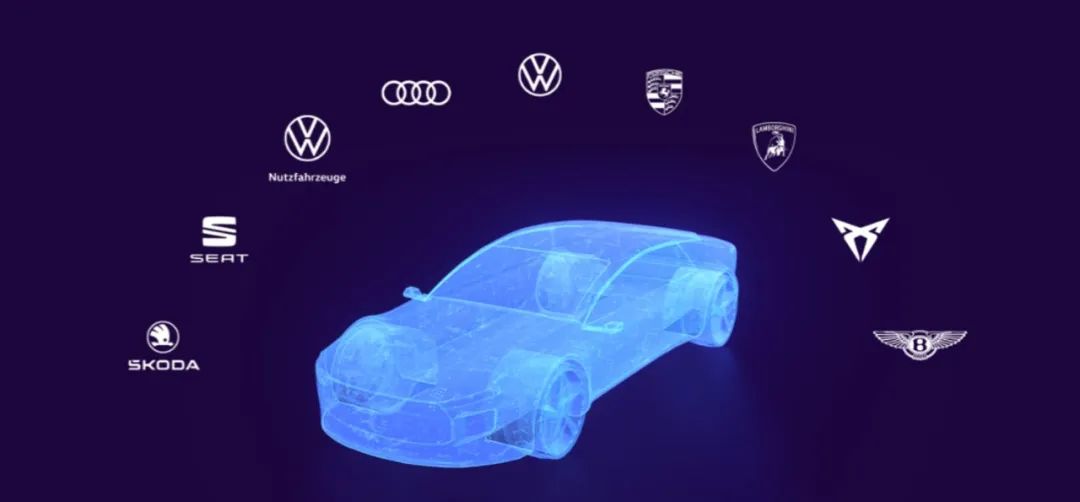
This includes spending 1 billion euros to convert the Emden plant on the Ems River in northwest Germany into an electric vehicle production facility, with a planned annual production capacity of 3 million ID.4 models. However, the plant's capacity has not been fully utilized to date.
At the Hanover plant, Volkswagen spent 21 billion euros to transform factories in Wolfsburg, Hanover, Braunschweig, Salzgitter, Osnabrück, and Emden to produce electric vehicle models for brands like Audi and Bentley. However, there are still no clear results as of now.
Furthermore, Volkswagen plans to independently develop and produce electric vehicle batteries, investing 2 billion euros to establish the Volkswagen Europe Battery Center, scheduled to commence production in 2025.
Most importantly, Volkswagen has spent billions of euros to establish the software company Cariad. Despite significant investments, Cariad has failed to enable Volkswagen Group to achieve digital transformation and software leadership. Instead, the harder it tries, the greater the gap with competitors becomes.
From the perspective of frontline workers, these investments are the wrong decisions made by the top management of Volkswagen's board, leading to a decline in Volkswagen's competitiveness and soaring production costs due to underutilized factory capacity, not excessive worker compensation.

At the same time, the union also believes that the compensation of group executives is significantly higher. Although they have taken the lead in reducing salaries, it is still much higher than that of ordinary employees, and no one is paying for wrong decisions. Even executives who have left still receive substantial salaries from Volkswagen Group.
Amid mutual accusations between management and the union, protests outside Wolfsburg have hardly stopped. With the announcement of new layoff and shutdown plans, more workers have joined the wave of strikes demanding unpaid wages, spreading to more cities. For example, in Stuttgart, Porsche employees joined local protests.
Currently, Volkswagen Group and the union have not reached a consensus. The next round of negotiations will be held on November 21. Union representatives have announced that if there is no progress, a warning strike will be held on December 1.
As a company that has operated in Wolfsburg for over 87 years, Volkswagen Group is now facing its most severe operating crisis since its establishment. Externally, the company's sales, revenue, and profit margins have declined. Internally, layoffs in Germany have led to confrontations between the union and management, with rallies and demonstrations occurring from time to time.

As a multinational automaker, Volkswagen is also struggling to survive amidst international turmoil. After withdrawing from Russia, its core markets are limited to Europe and China, with slow expansion in emerging markets. These are the challenges Volkswagen Group faces in its external operations.
However, even a company of Volkswagen's size struggles to make quick adjustments in the face of these issues, and its slow transformation has only brought more problems.
Amid external and internal troubles, can Herbert Diess, Chairman of the Volkswagen Group Board of Management, handle this crisis, or will he be forced to step down like his predecessor Matthias Müller?
Note: Some images are sourced from the internet. Please contact us for removal if there is any infringement.

